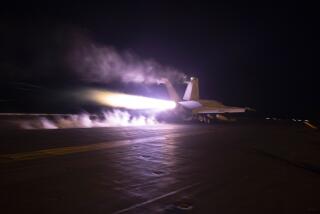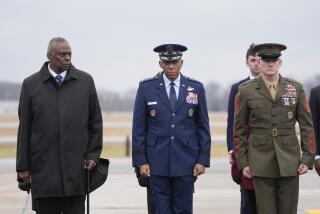Yemen’s president again promises to step down
With his country tilting toward civil war and powerful tribes and mutinous soldiers arrayed against him, Yemeni President Ali Abdullah Saleh said Saturday that he would step down soon.
Saleh, a shrewd political tactician who has stayed in power for more than three decades, has broken such promises previously. But the president appears to be losing his grip on a state engulfed in protests, an intensifying secessionist movement in the south and growing resistance from tribes, including a billionaire clan leader whose fighters are battling government forces in Sana, the capital.
“I reject power and I will continue to reject it, and I will be leaving power in the coming days,” Saleh said in a speech on state television. “I call on my supporters to persevere and to confront any challenge.”
The president’s announcement came the day after Tawakul Karman, a journalist and human rights activist, was awarded the Nobel Peace Prize for leading demonstrations against Saleh. The prize was the latest international repudiation of the longtime leader, who survived an assassination attempt four months ago.
His opponents dismissed Saleh’s vow to resign as another ploy.
“Saleh has given many speeches about leaving power and no one believes this,” said Mohammed Sabri, an opposition leader. “It’s an attempt to draw attention away from the Nobel Prize and to head off criticism” after the United Nations envoy left Yemen after weeks of failing to negotiate a compromise between Saleh and the opposition.
Bloodshed is increasing across deserts and mountains. The protests that began during the winter have been eclipsed by larger struggles, including a resurgent Al Qaeda affiliate. The turmoil in Yemen more closely resembles the violence ripping across Libya than the peaceful uprisings that overthrew autocrats in Egypt and Tunisia.
Even as pressures against him have multiplied, Saleh has refused to honor a plan backed by the United States and Persian Gulf states for a transfer of power. His surprise return to Yemen last month after recovering in Saudi Arabia from severe burns suffered in a rocket attack on his compound only heightened the unrest.
In Sana, Islamists and tribesmen loyal to Hamid Ahmar, a telecommunications tycoon, are pressing for an overthrow. Saleh’s army is also battling troops loyal to Maj. Gen. Ali Mohsin Saleh Ahmar, commander of the 1st Armored Division, who defected in March to support hundreds of thousands of antigovernment protesters. The general is not related to Hamid Ahmar.
To the south, security forces have lost territory, including Zinjibar and other towns, to a mix of secessionists, soldiers who defected, tribal sheiks and militants in Al Qaeda in the Arabian Peninsula. Tension has been rising in the south since the country’s 1994 civil war, when Saleh’s northern forces defeated a southern army backed by socialists.
Cooperation between clans and “rebels and AQAP presents a thorny dilemma for Washington,” said Michael Knights, a fellow at the Washington Institute for Near East Policy. “AQAP could well embed itself within the fabric of the southern opposition and eventually take it over from within.”
Yemen’s fate has long been tied to the whims of tribes. The president appeased, bought off and tricked clans in a clever mosaic that worked until his largesse and powers of persuasion began diminishing. Clan leaders grew rich and competed for influence but have become restive and dissatisfied.
“The tribes became so strong that their prowess equaled the power of the state,” said Adel Sharjbi, a sociology professor at Sana University.
Government jobs and just about anything flowing from the public coffers were doled out to tribes and Saleh’s family, who control much of the army and intelligence services.
Sheik Abdullah bin Hussein al Ahmar of the Hashid tribe was parliament speaker for years until his death in 2007. Today, six of his sons are members of the parliament and his family, including Hamid Ahmar, leads a confederation of some of the nation’s most powerful clans.
The confederation is split in its loyalties to Saleh. Much of it backs him, but key tribal leaders have joined the opposition. Hamid Ahmar and his followers, who are linked to extremist Islamic cleric Sheik Abdul Majeed Zindani, camp with protesters in Sana’s Change Square.
“There are still many big sheiks who believe President Saleh is the only one who can save Yemen,” said Faiz Hussein Jaber, a tribal sheik from Bani Matar. “You can see hundreds of thousands of tribesmen coming to support the president, and they wait for only an order to squash his opponents.”
Despite the fighting that has killed hundreds of civilians, the casualties could be much higher in a nation where nearly every home has several Kalashnikov rifles. But violence is becoming more difficult to contain, especially when provinces such as Marib and Shabwa, strongholds of Islamic militants, have largely slipped from government control.
“Many tribes have their own armies with people armed to the teeth,” Sharjbi said. “There are three main weapons markets in tribal areas where one can buy any arms, light or heavy.”
As pro-government snipers shoot protesters, gunmen storm alleys and the army shells southern cities, there seems no end to the unrest, which has cost the nation of 24 million people more than $8 billion.
Yemen faces many scenarios if Saleh doesn’t step down, few of them promising.
Abdul-Hakim Zaher, an expert on security affairs, predicted wider bloodshed. “With the political strife, the protests and the violence between pro- and antigovernment tribes, it is very hard to anticipate what will happen, but civil war is a likely outcome.”
Times staff writer Fleishman reported from Cairo and special correspondent Al-Alayaa from Sana.
More to Read
Start your day right
Sign up for Essential California for news, features and recommendations from the L.A. Times and beyond in your inbox six days a week.
You may occasionally receive promotional content from the Los Angeles Times.







